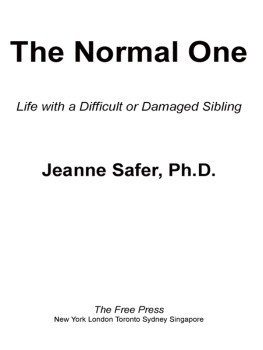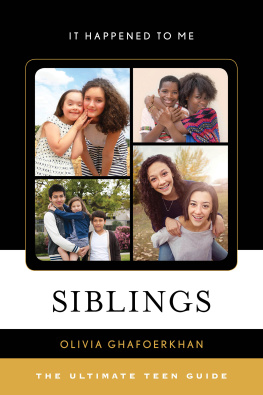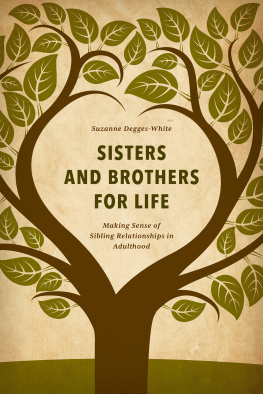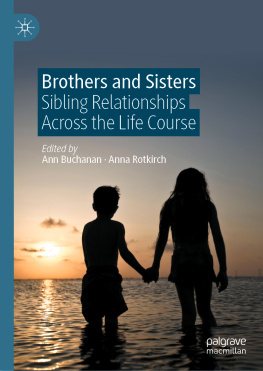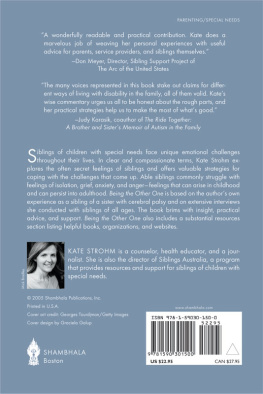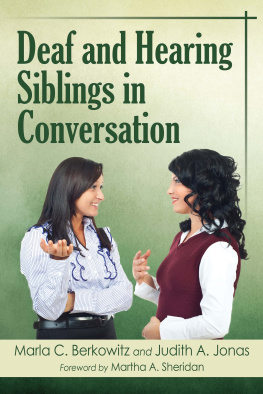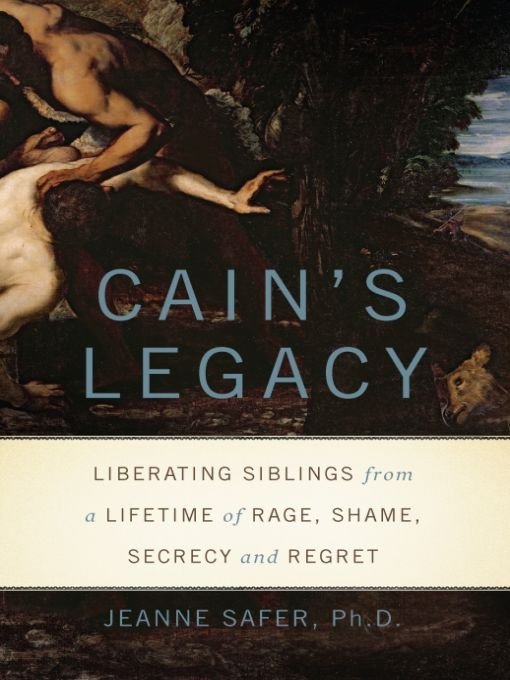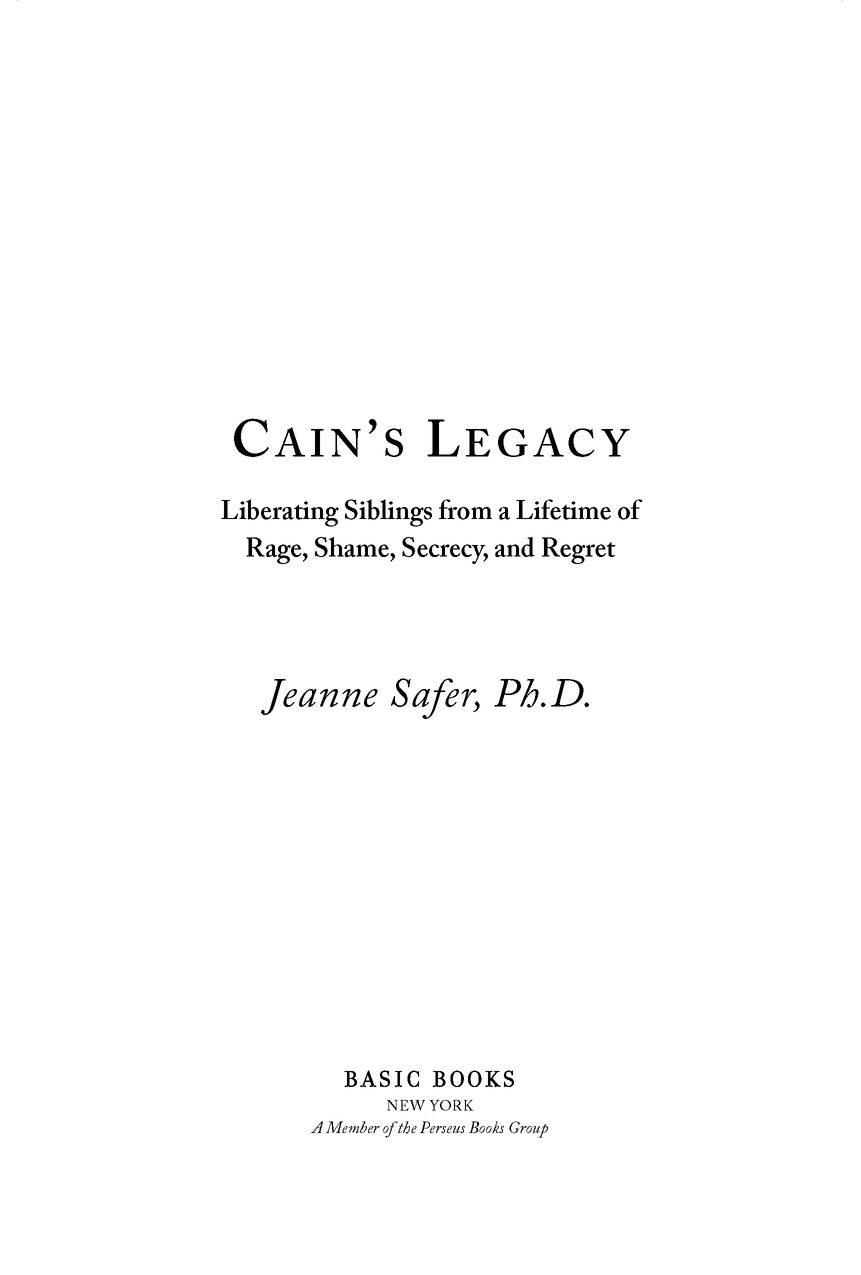Table of Contents
Also byJeanne Safer
Death Benefits: How Losing a Parent Can Change an Adults LifeFor the Better
The Normal One: Life with a Difficult or Damaged Sibling
Forgiving and Not Forgiving: Why Sometimes Its Better NOT to Forgive
Beyond Motherhood: Choosing a Life Without Children
For Harriet Wald,
my sister by choice
Fraternal love, sometimes almost every thing, is at others worse than nothing.
JANE AUSTEN, Mansfield Park
Hostile feelings towards brothers and sisters must be far more frequent than the unseeing eye of the adult can perceive.
SIGMUND FREUD, The Interpretation of Dreams
When we step into the family, by the act of being born, we do step into a world which is incalculable, into a world which has its own strange laws... into a world that we have not made.
G. K. CHESTERTON, Heretics
AUTHORS NOTE
The names and identifying information of everyone interviewed in this book have been changed.
ACKNOWLEDGMENTS
I want to thank the siblings I interviewed for sharing their experience with me with such depth and candor. Talking to them about this taboo topic was revelatory for me. I am indebted to my agent, Michelle Tessler, for her unfailing encouragement and clearheaded advice and to my editor, Thomas Kelleher, for his appreciation and expertise. Lara Heimert, editorial director of Basic Books, eased my way. My research assistant, Jessica Brinkforth, was tireless. Dr. Douglas Mock generously, wittily, and patiently gave me an informal tutorial in evolutionary biology and corrected many a misconception in my chapter on his specialty. Thanks to Joan Arnold, Dr. Cindy Baum-Baicker, Trudy Crandall, Dr. Paul Ehrlich, Dr. Barbara Kapatanakes, Amanda Moon, Rabbi Leonard Schoolman, and Dr. Nina Smiley for enthusiastic backup during the entire project and to my husband, Richard Brookhiser, for seeing me through it, as he always does.
My deep gratitude goes to Dr. Anne Hallward, host and creator of Safe Space Radio and a woman after my heart. She believed passionately in my project and personally recruited some of the most articulate, insightful subjects any author could wish for.
This book is dedicated to Harriet Wald, my dear friend and colleague, whose generosity, warmth, and unconditional love have sustained me for over three decades. She is the sister I wish I would have had.
INTRODUCTION
The Secret World of Sibling Strife
I had an older brother, but he was never a brother to me. We spent our childhoods at the same address with the same biological parents, ate dinner at the same table every night, and even shared a room for a few years at first, although we never shared a single confidence while we occupied it. We had the same coloring, the same body type, some of the same talents. But the universes we inhabited never intersected, and our parents were the same people in name only. Our relationship, begun in simmering mutual resentment, progressed to rare obligatory meetings, and ended in complete estranged silence. Although I made some futile attempts, I could never be a sister to him, and I did not grieve when he died at age sixty-four. Only a year later, when I happened to attend a concert of the vintage jazz he loved and performed, did I find myself weeping uncontrollably for what we never had.

At least one-third of the adult siblings in America suffer serious sibling strife like minethe number rises significantly, to 45 percent, when clinicians probe more deeply. Instead of feelings of kinship and warmth for their nearest relatives, these brothers and sisters feel secret shame, rage, guilt, resentment, alienation, contempt, or, worst of all, more cold indifference than a stranger could ever evoke. Frozen in time, frozen in place, they cannot be their adult selves in their adversarys company. Nobody thinks or talks about this predicament because nobody knows what to do about it. We convince ourselves that problem siblingsmany of whom seem perfectly normal except when they are driving us crazydont matter once we leave home and no longer live under the same roof with them, that they have no further impact on our lives. Denial tends to wear off over time, however; the majority of adult siblings, when questioned late in life, confess that they feel worse about unresolved relationships with brothers and sisters than about any other unfinished business. Eighty-five percent of Americans have siblings, and because these ties last longer than any othersfifty to eighty years is the norm, compared to the thirty to fifty years most people know their parentsand 90 percent of people over sixty-five still have at least one living sibling, thats a lot of regret. I wrote Cains Legacy to explore that regret, to relieve it, and, when possible, to transform it.
The trials of life with a mentally or physically dysfunctional sibling was the topic of my partially autobiographical book The Normal One, but as the powerful and revealing stories told by the sixty beleaguered adults of all ages I interviewed for Cains Legacy demonstrate, the phenomenon is far more widespread than that. A brother or sister need not be incapacitated to cause trouble.
Why are sibling woes so disturbing and so recalcitrant? Our first peer relationship has the deepest roots of all, and you cant get a divorce. Problems between husbands and wives derive from childhood experiences, but problems with siblings are childhood experiences in contemporary guise. Rivalry, competition, and anxiety about your place in your parents affections underlie these problems, breeding rancor that haunts siblings all their lives and recurs in each phase of adulthoodwork, marriage, parenthood, caring for aging parents, and, eventually, settling that perpetual minefield, the estate. The mutually injured parties (at least those who still maintain a precarious connection) walk on eggshells, loathe to confront each other for fear of precipitating an unfixable breech. As a result, their discord goes underground, only to reemerge in times of crisis, with mutually assured destruction.
Sibling strife is nothing like the normal fighting between brothers and sisters who basically get along. These opponents never make up; there is not enough goodwill to counterbalance their perennial grudges. Always on the defensive and in management mode, strife-ridden siblings never feel natural in each others company; they cannot be playful together or comfort each other. They even talk to each other in a special language, which I have dubbed Sibspeak, in which words are weapons rather than modes of communication. They view family occasions with foreboding and joint decision-making with dread. If you also have simpatico siblings the contrast is excruciating, but if your only sibling is estranged you cannot imagine what brotherly or sisterly tenderness feels like. You may tryoften successfullyto find surrogates with whom to imitate that instinctive intimacy, but it is never quite the same. Far beneath the surface, as I discovered, there still lurks a secret hunger for the fundamental security that loving family ties provide, a sanctuary forever inaccessible when your sibling cannot be your friend.


